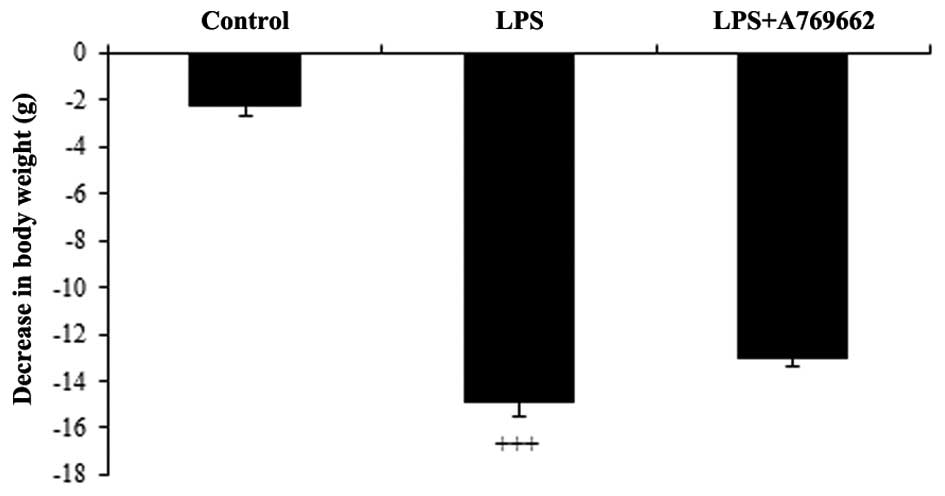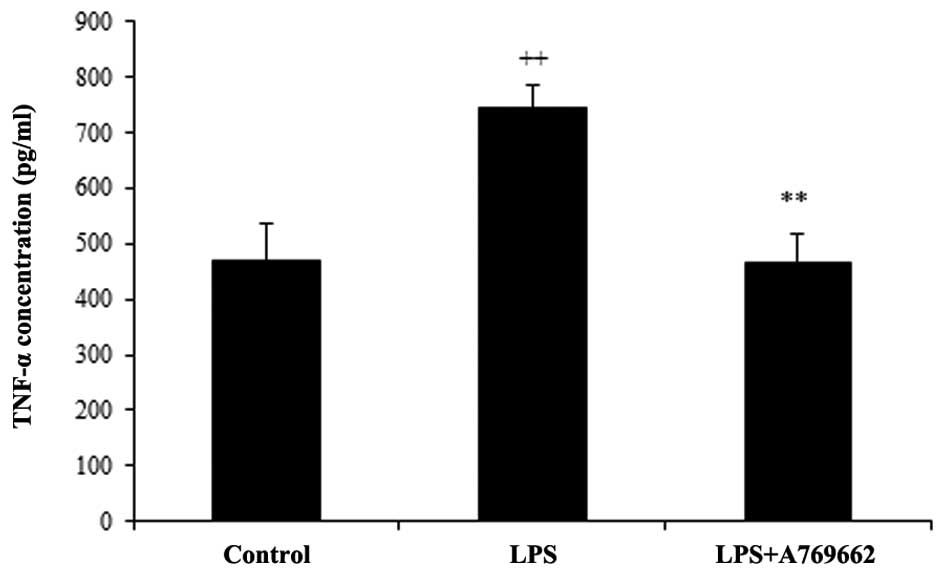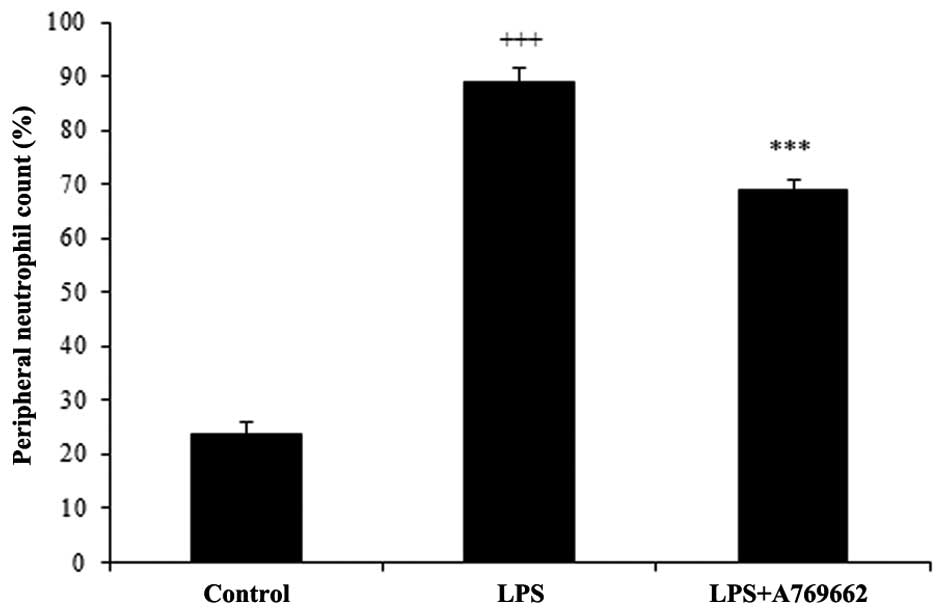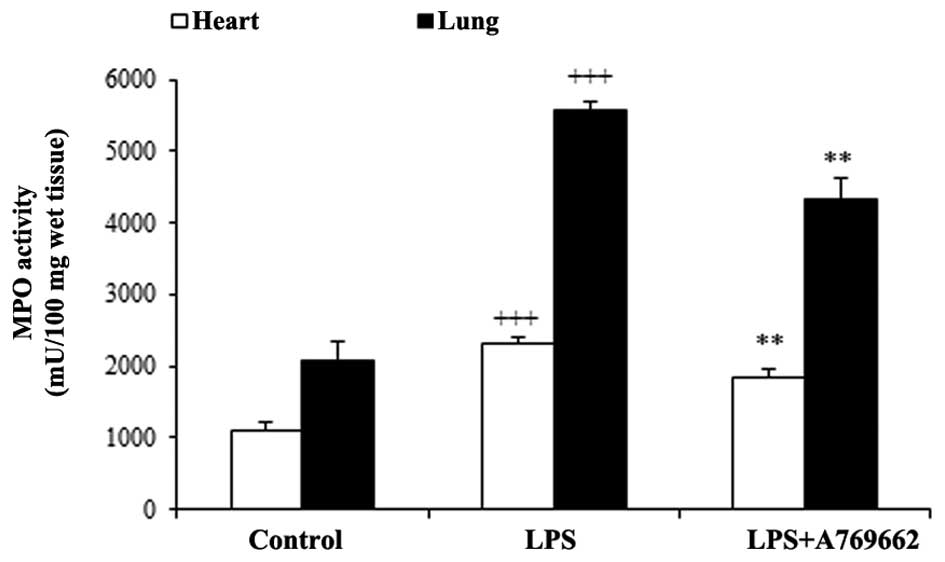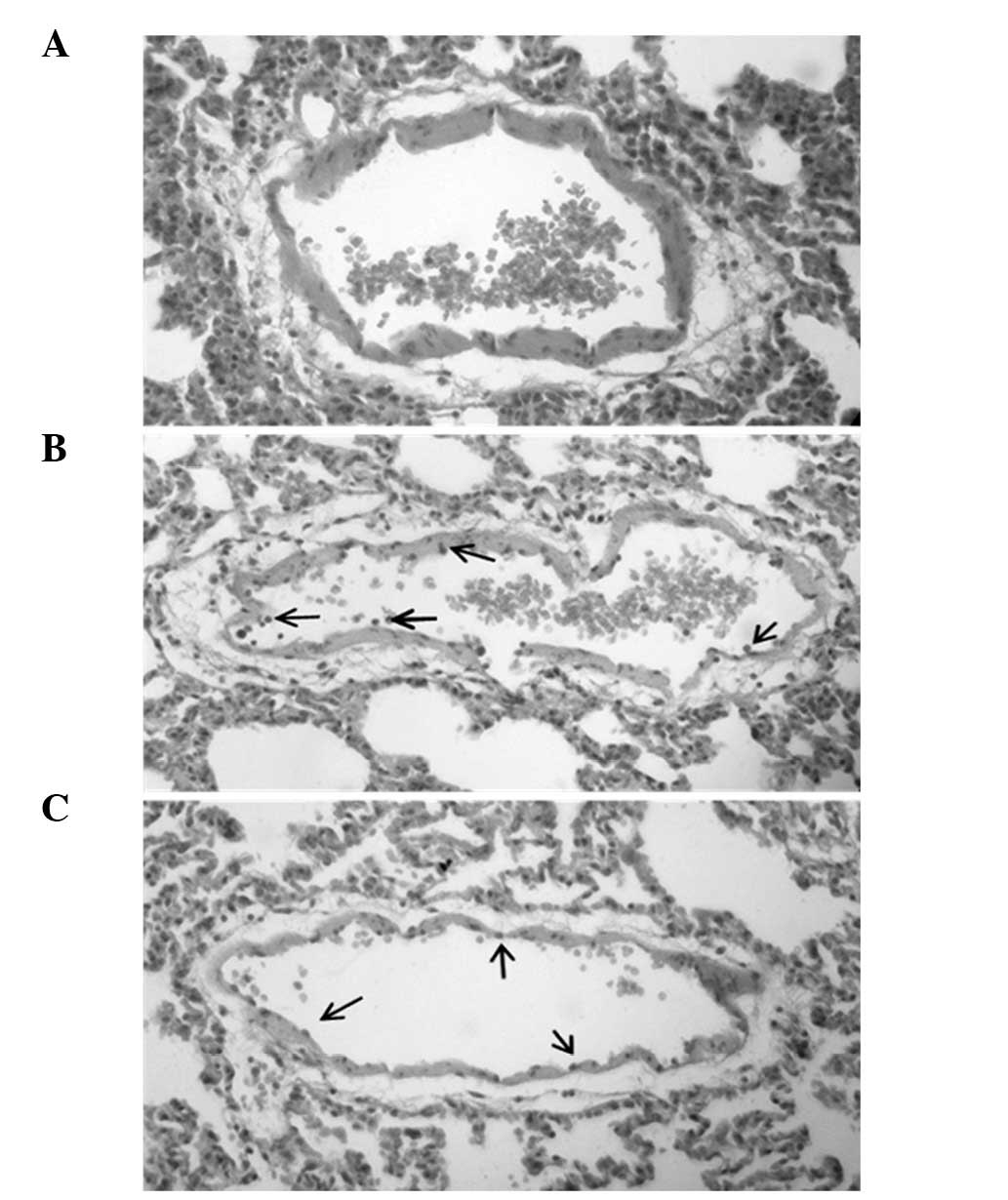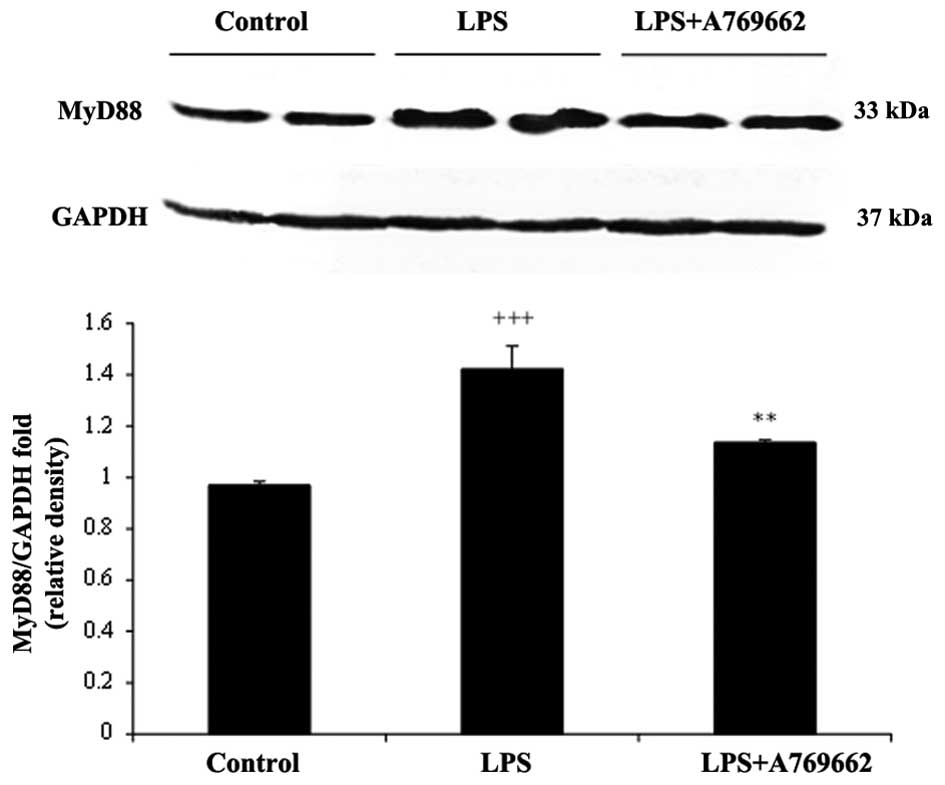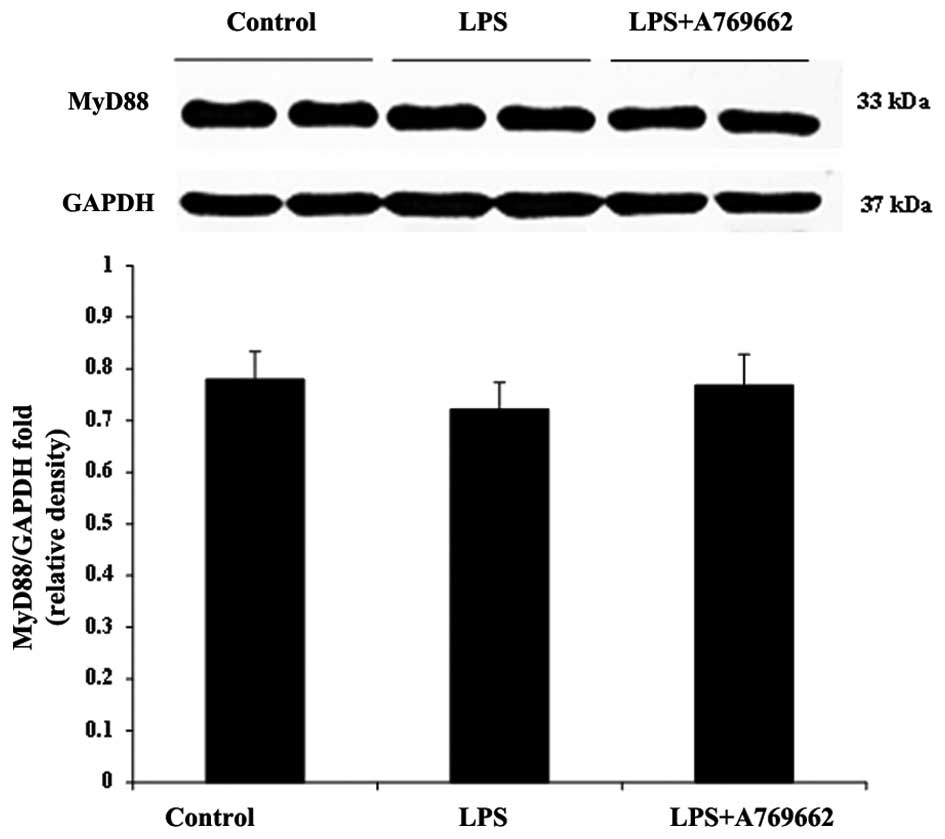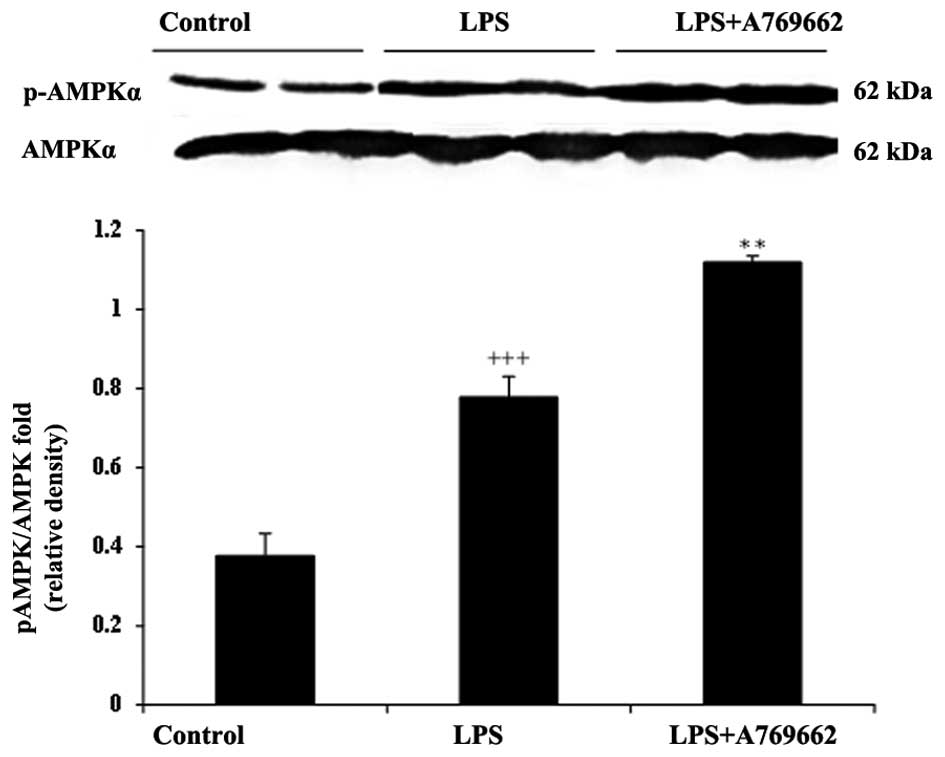|
1
|
Akira S and Takeda K: Toll-like receptor
signalling. Nat Rev Immunol. 4:499–511. 2004. View Article : Google Scholar : PubMed/NCBI
|
|
2
|
Takeda K: Evolution and integration of
innate immune recognition systems: The Toll-like receptors. J
Endotoxin Res. 11:51–55. 2005. View Article : Google Scholar : PubMed/NCBI
|
|
3
|
Beutler B: Inferences, questions and
possibilities in Toll-like receptor signalling. Nature.
430:257–263. 2004. View Article : Google Scholar : PubMed/NCBI
|
|
4
|
Cristofaro P and Opal SM: Role of
Toll-like receptors in infection and immunity: Clinical
implications. Drugs. 66:15–29. 2006. View Article : Google Scholar : PubMed/NCBI
|
|
5
|
Reitsma PH, Branger J, Van Den Blink B,
Weijer S, Van Der Poll T and Meijers JC: Procoagulant protein
levels are differentially increased during human endotoxemia. J
Thromb Haemost. 1:1019–1023. 2003. View Article : Google Scholar : PubMed/NCBI
|
|
6
|
Ramana KV, Willis MS, White MD, Horton JW,
DiMaio JM, Srivastava D, Bhatnagar A and Srivastava SK:
Endotoxin-induced cardiomyopathy and systemic inflammation in mice
is prevented by aldose reductase inhibition. Circulation.
114:1838–1846. 2006. View Article : Google Scholar : PubMed/NCBI
|
|
7
|
Jardin F, Brun-Ney D, Auvert B, Beauchet A
and Bourdarias JP: Sepsis-related cardiogenic shock. Crit Care Med.
18:1055–1060. 1990. View Article : Google Scholar : PubMed/NCBI
|
|
8
|
Connor AJ, Chen LC, Joseph LB, Laskin JD
and Laskin DL: Distinct responses of lung and liver macrophages to
acute endotoxemia: Role of toll-like receptor 4. Exp Mol Pathol.
94:216–227. 2013. View Article : Google Scholar :
|
|
9
|
Soraya H, Farajnia S, Khani S, Rameshrad
M, Khorrami A, Banani A, Maleki-Dizaji N and Garjani A: Short-term
treatment with metformin suppresses toll like receptors (TLRs)
activity in isoproterenol-induced myocardial infarction in rat: Are
AMPK and TLRs connected? Int Immunopharmacol. 14:785–791. 2012.
View Article : Google Scholar : PubMed/NCBI
|
|
10
|
Soraya H, Clanachan AS, Rameshrad M,
Maleki-Dizaji N, Ghazi-Khansari M and Garjani A: Chronic treatment
with metformin suppresses toll-like receptor 4 signaling and
attenuates left ventricular dysfunction following myocardial
infarction. Eur J Pharmacol. 737:77–84. 2014. View Article : Google Scholar : PubMed/NCBI
|
|
11
|
Bai A, Ma AG, Yong M, Weiss CR, Ma Y, Guan
Q, Bernstein CN and Peng Z: AMPK agonist downregulates innate and
adaptive immune responses in TNBS-induced murine acute and
relapsing colitis. Biochem Pharmacol. 80:1708–1717. 2010.
View Article : Google Scholar : PubMed/NCBI
|
|
12
|
Nath N, Giri S, Prasad R, Salem ML, Singh
AK and Singh I: 5-aminoimidazole-4-carboxamide ribonucleoside: A
novel immunomodulator with therapeutic efficacy in experimental
autoimmune encephalomyelitis. J Immunol. 175:566–574. 2005.
View Article : Google Scholar : PubMed/NCBI
|
|
13
|
Zhao X, Zmijewski JW, Lorne E, Liu G, Park
YJ, Tsuruta Y and Abraham E: Activation of AMPK attenuates
neutrophil proinflammatory activity and decreases the severity of
acute lung injury. Am J Physiol Lung Cell Mol Physiol.
295:L497–L504. 2008. View Article : Google Scholar : PubMed/NCBI
|
|
14
|
Shirwany NA and Zou MH: AMPK in
cardiovascular health and disease. Acta Pharmacol Sin.
31:1075–1084. 2010. View Article : Google Scholar : PubMed/NCBI
|
|
15
|
Young LH, Li J, Baron SJ and Russell RR:
AMP-activated protein kinase: A key stress signaling pathway in the
heart. Trends Cardiovasc Med. 15:110–118. 2005. View Article : Google Scholar : PubMed/NCBI
|
|
16
|
Dyck JR and Lopaschuk GD: AMPK alterations
in cardiac physiology and pathology: Enemy or ally? J Physiol.
574:95–112. 2006. View Article : Google Scholar : PubMed/NCBI
|
|
17
|
Hardie DG, Carling D and Gamblin SJ:
AMP-activated protein kinase: Also regulated by ADP? Trends Biochem
Sci. 36:470–477. 2011. View Article : Google Scholar : PubMed/NCBI
|
|
18
|
Hardie DG: Minireview: The AMP-activated
protein kinase cascade: The key sensor of cellular energy status.
Endocrinology. 144:5179–5183. 2003. View Article : Google Scholar : PubMed/NCBI
|
|
19
|
Kemp BE: Bateman domains and adenosine
derivatives form a binding contract. J Clin Invest. 113:182–184.
2004. View Article : Google Scholar : PubMed/NCBI
|
|
20
|
Kim AS, Miller EJ, Wright TM, Li J, Qi D,
Atsina K, Zaha V, Sakamoto K and Young LH: A small molecule AMPK
activator protects the heart against ischemia-reperfusion injury. J
Mol Cell Cardiol. 51:24–32. 2011. View Article : Google Scholar : PubMed/NCBI
|
|
21
|
Cool B, Zinker B, Chiou W, Kifle L, Cao N,
Perham M, Dickinson R, Adler A, Gagne G, Iyengar R, et al:
Identification and characterization of a small molecule AMPK
activator that treats key components of type 2 diabetes and the
metabolic syndrome. Cell Metab. 3:403–416. 2006. View Article : Google Scholar : PubMed/NCBI
|
|
22
|
Göransson O, McBride A, Hawley SA, Ross
FA, Shpiro N, Foretz M, Viollet B, Hardie DG and Sakamoto K:
Mechanism of action of A-769662, a valuable tool for activation of
AMP-activated protein kinase. J Biol Chem. 282:32549–32560. 2007.
View Article : Google Scholar : PubMed/NCBI
|
|
23
|
Zhao X, Petursson F, Viollet B, Lotz M,
Terkeltaub R and Liu-Bryan R: Peroxisome proliferator-activated
receptor γ coactivator 1α and FoxO3A mediate chondroprotection by
AMP-activated protein kinase. Arthritis Rheumatol. 66:3073–3082.
2014. View Article : Google Scholar : PubMed/NCBI
|
|
24
|
Petursson F, Husa M, June R, Lotz M,
Terkeltaub R and Liu-Bryan R: Linked decreases in liver kinase B1
and AMP-activated protein kinase activity modulate matrix catabolic
responses to biomechanical injury in chondrocytes. Arthritis Res
Ther. 15:R772013. View
Article : Google Scholar : PubMed/NCBI
|
|
25
|
Meng X, Ao L, Meldrum DR, Cain BS, Shames
BD, Selzman CH, Banerjee A and Harken AH: TNF-alpha and myocardial
depression in endotoxemic rats: Temporal discordance of an
obligatory relationship. Am J Physiol. 275:R502–R508.
1998.PubMed/NCBI
|
|
26
|
Copeland S, Warren HS, Lowry SF, Calvano
SE and Remick D; Inflammation and the Host Response to Injury
Investigators: Acute inflammatory response to endotoxin in mice and
humans. Clin Diagn Lab Immunol. 12:60–67. 2005.PubMed/NCBI
|
|
27
|
Turyn D, Dominici FP, Sotelo AI and Bartke
A: Specific interactions of growth hormone (GH) with GH-receptors
and GH-binding proteins in vivo in genetically GH-deficient Ames
dwarf mice. Growth Horm IGF Res. 8:389–396. 1998. View Article : Google Scholar
|
|
28
|
Lu YC, Yeh WC and Ohashi PS: LPS/TLR4
signal transduction pathway. Cytokine. 42:145–151. 2008. View Article : Google Scholar : PubMed/NCBI
|
|
29
|
Lefort J, Singer M, Leduc D, Renesto P,
Nahori MA, Huerre M, Créminon C, Chignard M and Vargaftig BB:
Systemic administration of endotoxin induces bronchopulmonary
hyperreactivity dissociated from TNF-alpha formation and neutrophil
sequestration into the murine lungs. J Immunol. 161:474–480.
1998.PubMed/NCBI
|
|
30
|
Kim M and Tian R: Targeting AMPK for
cardiac protection: Opportunities and challenges. J Mol Cell
Cardiol. 51:548–553. 2011. View Article : Google Scholar :
|
|
31
|
Timmermans AD, Balteau M, Gélinas R,
Renguet E, Ginion A, de Meester C, Sakamoto K, Balligand JL,
Bontemps F, Vanoverschelde JL, et al: A-769662 potentiates the
effect of other AMP-activated protein kinase activators on cardiac
glucose uptake. Am J Physiol Heart Circ Physiol. 306:H1619–H1630.
2014. View Article : Google Scholar : PubMed/NCBI
|
|
32
|
Salminen A, Hyttinen JM and Kaarniranta K:
AMP-activated protein kinase inhibits NF-κB signaling and
inflammation: Impact on healthspan and lifespan. J Mol Med Berl.
89:667–676. 2011. View Article : Google Scholar
|
|
33
|
Myerburg MM, King JD Jr, Oyster NM, Fitch
AC, Magill A, Baty CJ, Watkins SC, Kolls JK, Pilewski JM and
Hallows KR: AMPK agonists ameliorate sodium and fluid transport and
inflammation in cystic fibrosis airway epithelial cells. Am J
Respir Cell Mol Biol. 42:676–684. 2010. View Article : Google Scholar :
|
|
34
|
Egan DF, Shackelford DB, Mihaylova MM,
Gelino S, Kohnz RA, Mair W, Vasquez DS, Joshi A, Gwinn DM, Taylor
R, et al: Phosphorylation of ULK1 (hATG1) by AMP-activated protein
kinase connects energy sensing to mitophagy. Science. 331:456–461.
2011. View Article : Google Scholar : PubMed/NCBI
|
|
35
|
Hattori Y, Nakano Y, Hattori S, Tomizawa
A, Inukai K and Kasai K: High molecular weight adiponectin
activates AMPK and suppresses cytokine-induced NF-kappaB activation
in vascular endothelial cells. FEBS Lett. 582:1719–1724. 2008.
View Article : Google Scholar : PubMed/NCBI
|















